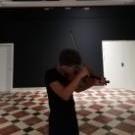Thank you for taking the time to comment on this. I used to work in this way more frequently -- taking a melody and using it as a compositional basis. For instance, I composed an orchestral piece a traditional Polish melody (link); used a medley of melodies (this is one of Chopin's) whilst improvising at the piano (link); used ancient Greek melodies (link); and I use my own pieces as a basis all the time (link) etc.
Each was with different methodologies with a variance of flexibility. The Polish melody one for instance was originally much simpler (spontaneous), but the orchestration grew more ordered and complex as it was revised, controlling its usage to a planned structure; the improvised set was completely spontaneous; and the last one was planned merely to utilize the melody. In any of the examples though, I felt it was more important my manipulation of the material as opposed to being accurate to the original -- capturing the spirit through recomposition and by taking ownership and controlling the material in as personal a way as possible.
It is definitely a fun way to compose, especially the more thorough and inquisitive the approach. Having some form of order to control when and how material is introduced is certainly helpful. I learned this when composing a work for brass quintet, when one work of mine used 16 quotations of various people and the form was hard to bind together in a convincing enough manner, in my opinion.
I doubt I would return to this piece (it was back when I was still using a "opus" based catalogue, and it was written when I was a different person). But, it was a fundamental style of composition that helped push me into other areas. This piece was composed in one sitting and without much thought aside from what was spontaneous, which is a consequence of my improvising background. Just writing in that manner has its benefits, but is by no means free from drawbacks.
Thanks again for commenting, and I am contending posting more music at one point though I am trying not to overdo it to be honest. I, like many, write a considerable amount of music, often times for no reason at all, which is not particularly wise when you are someone that is, like me, prone to mental health issues. But it would be nice to have for you more relevant examples of my writing, if only to share them with someone other than myself.



